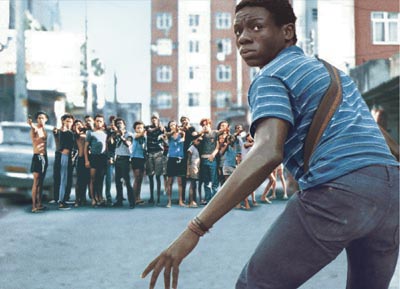I recently watched “Flags of Our Fathers,” a film that mentioned the potential of a photo to win or lose a war. The one at Iwo Jima declared victory for America. Several in Vietnam ended the campaign flat out. And the many by one resident of the Cidade de Deus (“City of God”) told the world they existed.
“City of God” is one of the most culturally significant films in years because it observes one of the worst societies in the world with such great depth and insight. The Cidade de Deus are gruesome slums located in the otherwise picture perfect area of Rio de Janiero and remain unchanged because the people living there are so removed from the postcard image for the government to know or care. The film tells the story of Rocket (Alexandre Rodreigues), a teenage boy that for so long has resisted becoming a hoodlum or dead and now wishes to escape through his love of photography.
The film has a vivid screenplay that tells multiple episodic tales about the town and its residents. It starts interestingly enough, telling Rocket’s story chronologically, but the nature of the film is to back track, linking together these multiple stories so fluidly. Through the same shot, Director Fernando Merielles can create astounding revelations about the characters and their relation to one another. For instance, the mysterious disappearance of a character and another’s rise to power would never be as clear cut if told in order, but the shocking way in which they link almost seem to justify the sudden pounding on a door we’ve already heard three times.
This beautifully woven tapestry of a screenplay not only tells a tragic story but also explains the inner workings of a town that will always seem to be thriving on crime and violence. Continue reading “City of God”
